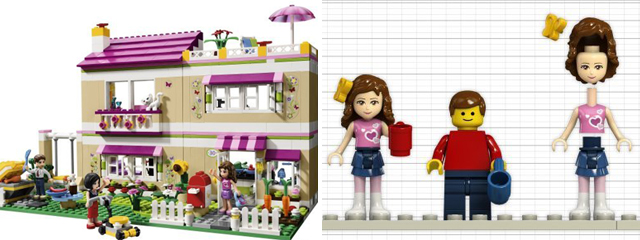
Debate over gender-based toy marketing has reached a fever pitch. In December, LEGO -- a brand that previously could do no wrong -- came out with a girlified version of their beloved blocks called LEGO Friends, and the marketers behind this switch were greeted with a bellowing, albeit virtual, "Why?" Now, a pair of 22-year-old activists for girls, Bailey Shoemaker Richards and Stephanie Cole, have launched a petition to get LEGO to commit to gender equity in marketing.
The de facto spokeswoman for this campaign, as well as anyone who has ever protested so-called princess culture, seems to be 4-year-old Riley Maida. Her one-minute and 11 second rant about toy marketing took the Internet by storm in December.
"Some girls like superheroes, some girls like princesses, some boys like superheroes, some boys like princesses. So why do all the girls have to buy pink stuff and all the boys have to buy different color stuff?" she asked.
Sarah Maida, Riley's mom, told The Huffington Post that this video was actually shot in May of 2011. She and her husband Dennis had shared it with a few friends, who responded positively to Riley's message. But, after Sarah heard about LEGO Friends -- shapely mini-figures that lock into pink, purple and pastel green settings, such as a dream house, a splash pool and a beauty shop -- she posted the video on Facebook fan pages for Princess Free Zone and Pigtail Pals, companies that sell only gender-neutral products and stand up for girl's rights. (Princess Free's tagline is "Come as you are," and they sell apparel featuring designs like a dinosaur on a scooter or a skateboarding octopus.)
"I posted it because both sites were having a conversation about the new toys. I thought what Riley had to say was so perfect and relevant," she said.
According to the LEGO Group, their new line was designed based on four years of research into the ways in which boys and girls play.

Bradley Wieners, executive editor at Bloomberg Businessweek, investigated why LEGO was trying to attract more girls at all. On the surface, he discovered they were responding directly to parents like Peggy Orenstein, author of "Cinderella Ate My Daughter" and poster-mom for equal-opportunity play. He quoted Orenstein saying, "The last time I was in a Lego store, there was this little pink ghetto over in one corner. And I thought, really? This is the best you can do?" The goal was to give little girls another option when they reach the "princess phase," at around four-years-old, the time when boys their age enter their "LEGO-phase." Because, as BusinessWeek reported, "Unlike tiaras and pink chiffon, Lego play develops spatial, mathematical, and fine motor skills, and lets kids build almost anything they can imagine, often leading to hours of quiet, independent play."
But, Wieners foresaw backlash to LEGO Friends. "They're definitely running a risk here of reinforcing some stereotypes, even as they try to break down the ones about girls building," he told NPR's Morning Edition.
And, within a few weeks of Wiener's article running and the new LEGOs being announced, a 1981 LEGO ad surfaced -- a photo of an adorable little redheaded girl (pictured below). She is wearing overalls and sneakers. She is holding an elaborate LEGO creation. The ad copy: "What it is is beautiful." Parents and childless adults alike connected with the image, clicked their Like buttons and sent it flying around Facebook. For places like Princess Free Zone and moms like Sarah Maida, the ad was a perfect foil to LEGO's newer, glossier, "sexier" girl-focused ads.
"It would be easy to assume that this is just about LEGO, but [it] is part of a much larger marketing environment that puts the interests of girls and boys into ... limiting boxes," said Cole, one of the women behind the new petition agains LEGO Friends. Indeed, other classic brands including Rainbow Brite, Strawberry Shortcake, My Little Pony -- and even Troll dolls -- have been transformed. The characters are much more slender, many look like they've gotten hair extensions, the Trolls carry purses. Sociological Images found nine examples which can be seen below.
Still, LEGO Friends touched a nerve that these other brands didn't. More than 45,000 people have signed Cole and Richards' petition, and parents are taking to Twitter, helping to spread word about the campaign with their hashtag #LiberateLEGOs.
To drive their message home, SPARK, the organization Cole and Richards are a part of, and Powered by Girl produced a video including footage of young girls today playing with traditional primary colored LEGO sets; they're building houses, stadiums and "trucker hide-outs." One little girl, wearing a princess dress, says, "I can build anything!" And, Riley Maida herself makes an appearance. She shares her favorite thing about LEGOs: "You can do whatever you want [with them]."
For parents who are concerned about the potential negative impact of gendered marketing, the best solution may be encouraging this kind of creativity at home -- and discussing issues around the dinner table. As Sarah Maida said:
"I have no problem with them making pink LEGOs, but I really hate the message they send. [Riley] doesn't need to be building a hot tub and serving drinks. I want her to build whatever she wants. We want her to be herself."
Click through to see LEGO Friends and other brands that have been updated in recent years to be more "girly" (via Sociological Images)
Correction: A previous version of this story stated that the aim of the petition was to shut down the LEGO Friends line.